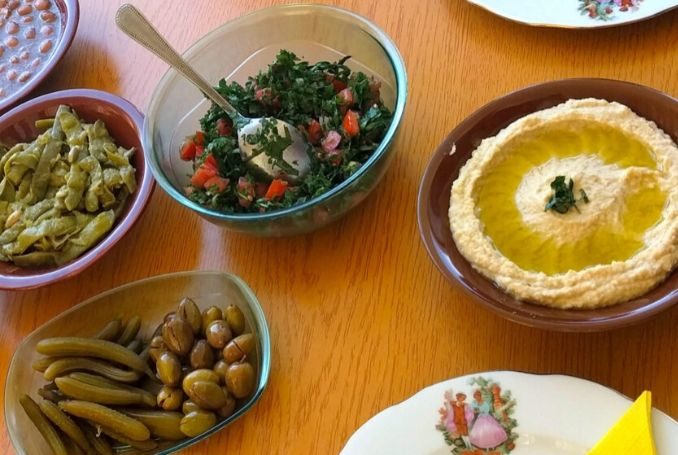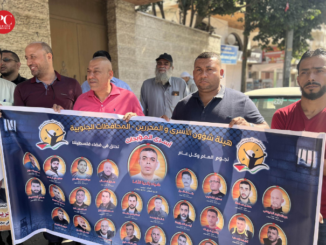
By Benay Blend
As a central aspect of everyday life, food plays a prominent role in the manipulation of the Palestinian landscape and serves as an entry into the history, culture, and identity of not only cooks tied to that environment but also those who carry that tradition elsewhere. In recent years various writers and chefs have helped to popularize Palestinian fare in an effort to humanize a people who have been so dehumanized by the media.
In the face of this dehumanization, the late Anthony Bourdain stands out as a celebrity who helped to bring such dishes as mulukhiya, a traditional Palestinian dish that is made with a local variety of mallow leaves and chicken, to the wider world. He also brought names to the faces of many who have remained anonymous if mentioned at all by the media.
In one of many eulogies, artist and conservationist Vivien Sansour recalls that when she acted as Bourdain’s guide during his visit to Aida camp, the “idol of cuisine” appeared more interested in “the story of a population trapped inside a concrete jungle in their own homeland” than ingredients that went into the making of mulukhiya.
Anthony #Bourdain, Friend of #Palestine, Dies in France (VIDEO) https://t.co/if8T1O14FY via @PalestineChron pic.twitter.com/DK1IULiyjM
— Palestine Chronicle (@PalestineChron) June 8, 2018
Children playing ball, soldiers menacing residents with their guns, Israeli sniper posts—all of this mingled with aromas of not yet prepared food waiting for Bourdain to arrive.
In the end, Sansour recounts, her charge was more interested in talking politics than food, perhaps because he understood that all cuisines, but Palestinian in particular, exists within a context. In this case, it’s the occupation that can’t be separated from gastronomy. In 2014, Bourdain won an award from the Muslim Public Affairs Council and expressed lessons learned in Aida camp as part of his acceptance speech.
“People are not statistics,” Bourdain explained. “That is all we attempted to show.”
That is what this article, too, hopes to show, that regional dishes are embedded in distinctive cultures and are part of what Palestinians in their daily lives are attempting to preserve. All of this is wrapped up in politics, in the same way, that the scent of greens and garlic mixed with scenes of Palestinian resistance during Bourdain’s visit.
Since his death, others have carried on what Bourdain started, though few, perhaps, have shared his sensitivity.
In a New York Times article aptly titled “The Rise of Palestinian Food,” Ligaya Mishan traces the growing popularity of certain dishes, but, more importantly, alludes to issues related to the commodification of regional food.
Mentioning its very source as “Palestine,” explains Mishan, carries with it the possibility of political conflict. In a largely academic argument, she continues, designed to deflect the existence of Palestine as a literal place, food critics, restaurant owners, and writers of cookbooks, to name a few, have “subsumed” Palestinian food “under the oversimplified label of ‘Middle Eastern,’” or perhaps the more “euphemistic ‘Mediterranean,’” in order invoke European origins rather than Arabic/Palestinian.
#Sahteen: Try One of these Five #Palestinian #Recipes Today (VIDEOS) https://t.co/ZuRsdgC3hp via @PalestineChron pic.twitter.com/N9yWaHGOpK
— Palestine Chronicle (@PalestineChron) January 28, 2020
Along with nearly 700,000 Palestinians, Joudie Kalla’s family fled their homeland during the 1948 Nakba, the catastrophe that resulted in expulsion. Now a chef and author of several cookbooks, Kalla recounts in Baladi Palestine: A Celebration from Land and Sea (2018) how Palestinians under the 70-year-long Occupation have struggled to keep their culture intact, particularly by passing on to future generations traditional music, art and literature and, most pertinent to this article, food (p.7).
Since that publication, my own collection of Palestinian cookbooks has grown: Reem Kassis, The Palestinian Table (2017), Yasmin Khan, Zaitoun (2019), and soon to arrive Sami Tamimi, Falistin.
Accordingly, Mishan asks a tricky question: Since each book delves into the political context of the cuisine, should there be an effort to give voice to what she alludes to as “the countless accusations and defenses that can make a case for suffering on both sides?” The short answer is “no.”
As the colonized, Palestinians have a legal right to fight back in whatever way they please, in this case through cooking as a form of cultural preservation in the wake of Israeli efforts to erase their presence on the land.
“If to say ‘Palestinian’ is in itself a political act,” claims Mishan, “then each author is, in effect, an advocate.” From there, however, she wanders back and forth, meandering from acknowledging that food preparation is a powerful form of resistance to wondering if it’s possible to preserve an identity on a map of absence.
“To eat Za’atar,” she explains, “is to remember the land from which the herb was historically gathered.” But more than that, what is not said, is that Za’atar has the capability of growing between rocks on arid land, thereby symbolizing the resilience and sumoud of the people.
As Mishan here explains:
“What binds a people is a collective repository of memories and a consensual commitment to a way of life — a commitment that is not only sustained when they are sundered from their ancestral lands but arguably grows all the stronger for it.”
She goes on to say, however, that “declaring allegiance to a nation need not be intrinsically political,” or perhaps not a “conscious choice.” If it were merely “beginning the day with a bowl of tahini,” as she suggests, how to explain the many movements devoted to the right of return?
How to explain New York City Mobilization for Land Day and the Great Return March, on March 29, 2020, hosted by Samidoun Prisoner Solidarity Network, Al-Awda-NYC Right of Return Coalition, and others, all focused on the Palestinians legal right to return to their homeland?
In addition, Mishan mentions several threats to the continuance of traditional cooking. Like “Mediterranean cooking,” which seeks to shift culinary origins to a European past, the term “Israeli cuisine,” she says, also stirs up controversy because it erases what she calls “Arab influences.” Mishan, though, skirts around the issue of cultural appropriation; “in its most basic definition,” she claims, “Israeli cuisine is simply what the people of Israel eat.”
Is green chile stew, then, the staple of New Mexicans, simply what the people of America eat, with no regard to its origins? My Hispanic neighbors would no doubt disagree.
“In the food of their Palestinian neighbors,” Mishan writes, Israelis sought “a connection to the land and their ancestors.” In this way, she erases the violence of ’48 followed by 72 years of ongoing Nakba.
Because public debate around this topic is “crude and sensational,” Steven Salaita explains, these kinds of “misunderstandings predominate.” At issue is not who “cooks or eats,” but rather “who controls the branding and profitability of the food.”
If “theft” is a more correct term than “appropriation,” as Salaita claims, for it goes beyond individual consumption to call out settler colonialism in all its forms, then culinary sharing, as Mishan writes, will not lead to any kind of intercultural harmony, the kind that liberals resort to when they praise groups like Seeds for Peace.
Reflecting on research for her new cookbook, Reem Kassis contends that for Palestinians, who feel their “national identity undermined without an independent state,” food becomes a means to construct a sense of “rootedness,” a way to imaginatively reclaim a country. Alluding to Palestinian food as Israeli, then “add[s] insult to injury,” claims Kassis. “First the land, now the food and culture?”
What next? In conclusion, she understands that peace will not come through something so simple as Israel’s acknowledgment of the true origins of Palestinian cuisine. But it’s a “good place to start,” she explains, and now is perhaps as good a time as any.
– Benay Blend earned her doctorate in American Studies from the University of New Mexico. Her scholarly works include Douglas Vakoch and Sam Mickey, Eds. (2017), “’Neither Homeland Nor Exile are Words’: ‘Situated Knowledge’ in the Works of Palestinian and Native American Writers”. She contributed this article to The Palestine Chronicle.

– Benay Blend earned her doctorate in American Studies from the University of New Mexico. Her scholarly works include Douglas Vakoch and Sam Mickey, Eds. (2017), “’Neither Homeland Nor Exile are Words’: ‘Situated Knowledge’ in the Works of Palestinian and Native American Writers”. She contributed this article to The Palestine Chronicle.







